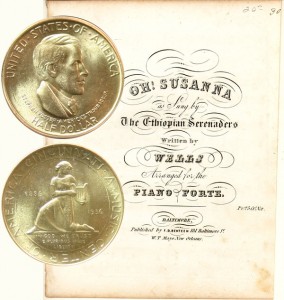Today, the Cincinnati Music Center Commemorative Silver Half Dollar Coin remembers Stephen Foster and the first public presentation of his popular Oh! Susanna on September 11, 1847.
Some music historians even recognize this date as the birth of modern American pop music.
In his 1987 book, America’s Music, Gilbert Chase wrote of Foster’s Susanna:
=====
On September 11, 1847, the Eagle Saloon advertised a Grand Gala Concert that featured “SUSANNA—A new song, never before given to the public.” Its success was immediate and soon became worldwide. To Stephen Foster it brought fame, but not fortune in the monetary sense. According to his brother Morrison, “he made a present of ‘Old Uncle Ned’ and ‘Oh, Susanna'” to the publishers W.C. Peters of Cincinnati, and the latter “made ten thousand dollars out of them.” On the other hand, a contemporary of Foster tells us that Stephen was delighted “in receiving one hundred dollars in cash” for “Oh! Susanna,” and has him saying that “the two fifty-dollar bills I received for it had the effect of starting me on my present vocation of song-writer.”
=====
Though Foster lived in Cincinnati, the first live performance of his soon-to-be popular piece occurred in Pittsburgh.
The Pittsburgh Music History described the venue and results:
=====
The Eagle Ice Cream Parlor was located in a second floor Hall of a building on Wood Street. It was owned by Mr. Andrews who rented the hall to sell confections, cakes, and ices. He furnished in the small tables and erected a stage. To draw customers he offered entertainment. The ten cent admission was waved with the purchase of baked goods or ices. Andrews advertised the entertainment heavily in the Gazette and other newspapers. He also ran song contests for comic, sentimental, and minstrel songs with audiences deciding the prize winners. Winners received rings, gold chains, or silver cups.
“Oh! Susanna” was performed for the first time publicly on September 11, 1847 by the Kneass Opera Troupe. From that performance and later performances in New York the song spread like wild fire. People all over country were singing it. Over 100,000 copies of the sheet music for “Oh! Susanna” were sold. Nelson and his troupe continued to perform Stephen Foster’s music at the Eagle Ice Cream Parlor. In 1847 The Kneass Opera Troupe performed Foster’s songs on a tour of the Ohio Valley.
=====
In 1936, Raymond Walters published his book Stephen Foster A Sketch of His Life and Background in Cincinnati and provided more details about the man and his music:
=====
‘A spirit of pleasure and youth’s golden gleam!’ It takes a magic line such as this of Wordsworth to suggest the fascination of the period from 1846 to 1850 which Stephen Collins Foster, aged twenty to twenty-three, spent in Cincinnati. The happiest years of his life, he called them, as his daughter has testified. He had the very heaven of being young, of working on his own in a large and stimulating city, and of composing melodies rendered in polite parlors and one lusty song, “Oh! Susanna,” roared by the Forty-Niners on their covered-wagon journeys to California and echoed around the world.
The chronicle of these youthful years of America’s Troubadour, as John Tasker Howard has happily termed Stephen Foster, deserves to be told in the fullness which recent investigation now makes possible. New facts have been found which reinforce the importance of the three Cincinnati years in the shaping of his genius. In this instance time and place were right for him.
…
It is hardly too much to assert there is not a family in this country where any musical taste exists, that has not been cheered with the melody of his songs. In fact they are sung all over the civilized world, the seacoast cities of China not excepted. We lately read of an American traveler (Bayard Taylor, we think) teaching “Uncle Ned” to the Arabs in Africa and explaining to them, at their request, the meaning of the words in their own dialect. A Paris correspondent of a Boston paper says, on hearing “Oh, Susannah” whistled through the streets, he enthusiastically cried out “America forever!”
Dickens speaks of its popularity in the prisons of England; and a friend who has spent some time in Central America says he has heard the natives amuse themselves by the hour in singing snatches of Foster’s early songs which they had caught from the roving Californians.
======
Here are just three examples of the lyrics from the many versions of the popular song:
Original:
I come from Alabama with my Banjo on my knee—
I’m goin’ to Louisiana my true love for to see.
It rained all night the day I left, the weather it was dry;
The sun so hot I froze to death—Susanna, don’t you cry.
Chorus:
Oh! Susanna, do not cry for me;
I come from Alabama, with my Banjo on my knee.
One Forty-Niner version:
I soon shall be in ‘Francisco
And then I’ll be all round
And when I meet the gold lumps there
I’ll pick them off the ground. . . .
So Brothers don’t you cry!
Oh California!
That’s the land for me
I’m going to Sacramento
With my washbowl on my knee!
A second Forty-Niner version out of Boston:
We started from Old Beverly,
Mid cheers from great and small,
We hope to get back bye and bye
When we’ll return them all. . . .
O! California
We’ll see you bye and bye
If we’ve good luck, and if we don’t
Why, bless you, don’t you cry.
=====
The Cincinnati Music Center Commemorative Silver Half Dollar Coin shows against the cover of one of the printed sheet music from 1848.
